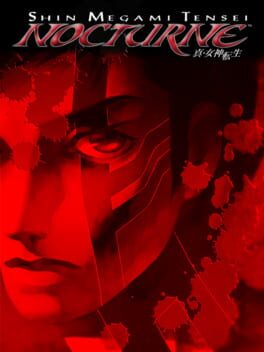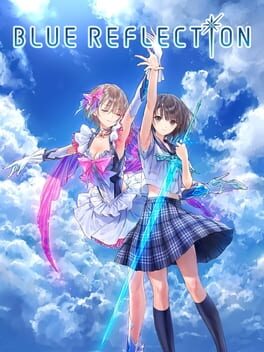zazaza
Badges

1 Years of Service
Being part of the Backloggd community for 1 year

Gamer
Played 250+ games

N00b
Played 100+ games
Favorite Games
335
Total Games Played
000
Played in 2024
014
Games Backloggd
Recently Reviewed See More
This review contains spoilers
Blue Reflection is a game with a few solid ideas but suffers from some pretty drastic issues in its core gameplay design. Battles provide no EXP to level your characters; instead, you engage in Persona social link-esque visual novel segments with cute girls that occasionally reward you with points to put into various stats. As each stat is leveled, new battle skills can be unlocked depending on how high certain stats are. Additionally, you obtain “fragments,” which are equippable to each skill and provide benefits ranging from straight skill power increases to stat debuffs. There’s a lot of flexibility here, however the micromanaging fragments becomes tedious due to some newly unlocked skills rendering previous ones useless, forcing you to rearrange your fragments each time to keep up. The game does not directly tell you the innate power of a skill, it is something you must infer from the moves MP cost and its “elemental” typing. This innate skill power is sometimes so much higher that they are more effective to use enemies even if you have a skill that can hit a weak point. One of your party members, Lime, seems to have skills that vastly out damage the other two party members, and that is despite me pumping quite a few points into everyone’s attack stat. My Hinako in particular had an attack stat very similar to Lime’s, but the former would do 500-1000 damage compared to the latter’s whopping 1000-4000 damage.
Regardless of any of this, the game is very easy to play, even when played on hard mode. The limit to how much you can grind these “social links” before the next major story event is very generous, allowing you to get grossly overpowered, turning fodder enemy encounters into “Yuzu’s turn -> Attack -> Grape Wave -> Win” and more difficult battles into applying debuff/buffs then nuking with Lime. You could raise the game difficulty by limiting how many of these events you do, but this sort of self-management in video games seems antithetical to the experience wherein the game developer makes a game that is well-paced. There is virtually nothing to do besides navigate the unchanging school, doing repeated fetch and “kill x amount of this enemy” quests in the same repeated environments (which are quite pretty in terms of art direction), and doing social links, and the game can get very stale as a result of this.
The battle system is Grandia-adjacent, but not as good and lacking in the positioning element. The game does introduce new battle mechanics until pretty late in the story, and they do a good job of shaking things up a bit. In addition to your typical MP resource for skills, you have a party-shared Ether gauge. You have to give up your characters turn to charge this gauge, but during boss fights when you can use your supporters (in essence these are attack extensions to your moves) as well. With Ether you can: use Overdrive to chain skill moves back-to-back for big damage, Guard to lower damage from oncoming attacks, Recover to restore HP and MP, Time to quicken your party’s wait time and slow your enemies’ wait time, and Support, which I have no idea about because it never seemed necessary to use. I used Recover and Time once or twice, Guard was quite useful (and also has a “just guard” like system that rewards timing), but Overdrive is easily the best usage of Ether, especially when you are eventually able to chain 3 skills into a special ultimate skill move. I like this system conceptually as it could have allowed for some pretty interesting decision making based on the condition of your party members, how much Ether you have, and who’s turn is up next on the time line. I think this potentially could have been alieved if the developers opted to restrict the player more. Freedom is good but not when it comes at the expense of pacing. Pacing out events with the girls also makes their relationship develop in a more dynamic way. Persona is a good example of this; anyone playing this game probably has already played it I imagine.
Battle animations are solid. The boss fights in this game are presented nicely. They have multiple phases that are accompanied with a shift in BGM that helps rise the tension as they creep closer to your school. However, the strategy to beating all of them is the same: apply buffs/debuffs, spam AoEs, then dump your OD onto the boss with Lime. You also have to repeatedly fight the same bosses several times and with little down time in between which becomes increasingly tedious.
The other reason people would probably play this game is for cute girls. They rely heavily on standard anime tropes but there are some cute moments here in there. Most of the girls have some sport or hobby that they are passionate about that connects them with Hinako, our protagonist. Hinako is deeply passionate about ballet but is unable to pursue it due to a permanent leg injury, a conflict that acts as a catalyst for her depressive state in the beginning of the game. She acts as a stoic straight man to the more idiosyncratic cast. Her character progresses over the course of the game after interacting with the cast and seeing their motivations and how they conquer their struggles with their respective passions. Fumio is one of my favorite characters in this game, her struggle to figure out what exactly piano means to her and how this overlaps with her audience feel very relatable and endearing. She romanticizes the idea of crunch time in software development fields, viewing it as a sort mental and physical trial that grants those who endure it some form of euphoric enlightenment. It’s a theme common in many Shonen anime, wherein the protagonist undergoes some torturous training to obtain special powers. I’m glad that the narrative frames this as naïve by highlighting how ineffective such practices are in boosting productivity. Lime and Yuzu also have some incredibly sweet and wholesome moments near the end of the game where they are revealed to have been big fans of Hinako’s ballet performances that managed to make an alpha gamer like me tear up. I think it helped Hinako coped with her injury if not by just a little bit, appreciating the fact that she could well up those sorts of emotions among her audience.
The fanservice here is incredibly disruptive and leads to some awkward narrative dissonance. During Rika and Kaori’s introductory chapters, the girls’ track team discover a hidden camera in their locker room. The perpetrator turning out to be an upperclassman deeply respected by both the Rika and Kaori. The narrative works to highlight the heartbreak, violation, and loss of safety that comes with such a traumatic situation, but yet also tries to interlace this event in-between constant shower scenes and panty shots that in turn, turn the player into the same peeping tom that the game is trying to condemn. This is probably this game’s (and many other works in the realm of anime) narrative folly: trying to tell a deeply personal story focused on empathizing with young girls while also positioning them firmly under the male gaze to pander to horny weebs. I get that Gust has shoestring budgets and they need to appeal to certain demographics to get sales, but the earlier Atelier games were shockingly progressive (by anime standards) so its disappointing Blue Reflection doesn’t get that same respect, given its deeper subject matter.
There's some pretty good atmosphere in the after school segments. The school is filled with soft orange Mexico filter lighting. Outside you can hear the sounds of shoes hitting dirt as the track team chat and cheer each other on. The track "I (sun)" that is always playing during these segments and I think it serves as a great ambiance. This games OST is a banger btw and really helps sell some moments in the game where the writing falters.
Blue Reflection is short for a JRPG. Filtering out my alt-tab time, it took be 25-ish hours to get through the game doing all available missions. I enjoyed most of my time with it but I wouldn’t recommend it to most people. There were some nuggets of gold in here though, so I’m hoping the sequel to this improves on the issues I complained about here.
character tier list:
https://i.imgur.com/glbXXHq.png
Regardless of any of this, the game is very easy to play, even when played on hard mode. The limit to how much you can grind these “social links” before the next major story event is very generous, allowing you to get grossly overpowered, turning fodder enemy encounters into “Yuzu’s turn -> Attack -> Grape Wave -> Win” and more difficult battles into applying debuff/buffs then nuking with Lime. You could raise the game difficulty by limiting how many of these events you do, but this sort of self-management in video games seems antithetical to the experience wherein the game developer makes a game that is well-paced. There is virtually nothing to do besides navigate the unchanging school, doing repeated fetch and “kill x amount of this enemy” quests in the same repeated environments (which are quite pretty in terms of art direction), and doing social links, and the game can get very stale as a result of this.
The battle system is Grandia-adjacent, but not as good and lacking in the positioning element. The game does introduce new battle mechanics until pretty late in the story, and they do a good job of shaking things up a bit. In addition to your typical MP resource for skills, you have a party-shared Ether gauge. You have to give up your characters turn to charge this gauge, but during boss fights when you can use your supporters (in essence these are attack extensions to your moves) as well. With Ether you can: use Overdrive to chain skill moves back-to-back for big damage, Guard to lower damage from oncoming attacks, Recover to restore HP and MP, Time to quicken your party’s wait time and slow your enemies’ wait time, and Support, which I have no idea about because it never seemed necessary to use. I used Recover and Time once or twice, Guard was quite useful (and also has a “just guard” like system that rewards timing), but Overdrive is easily the best usage of Ether, especially when you are eventually able to chain 3 skills into a special ultimate skill move. I like this system conceptually as it could have allowed for some pretty interesting decision making based on the condition of your party members, how much Ether you have, and who’s turn is up next on the time line. I think this potentially could have been alieved if the developers opted to restrict the player more. Freedom is good but not when it comes at the expense of pacing. Pacing out events with the girls also makes their relationship develop in a more dynamic way. Persona is a good example of this; anyone playing this game probably has already played it I imagine.
Battle animations are solid. The boss fights in this game are presented nicely. They have multiple phases that are accompanied with a shift in BGM that helps rise the tension as they creep closer to your school. However, the strategy to beating all of them is the same: apply buffs/debuffs, spam AoEs, then dump your OD onto the boss with Lime. You also have to repeatedly fight the same bosses several times and with little down time in between which becomes increasingly tedious.
The other reason people would probably play this game is for cute girls. They rely heavily on standard anime tropes but there are some cute moments here in there. Most of the girls have some sport or hobby that they are passionate about that connects them with Hinako, our protagonist. Hinako is deeply passionate about ballet but is unable to pursue it due to a permanent leg injury, a conflict that acts as a catalyst for her depressive state in the beginning of the game. She acts as a stoic straight man to the more idiosyncratic cast. Her character progresses over the course of the game after interacting with the cast and seeing their motivations and how they conquer their struggles with their respective passions. Fumio is one of my favorite characters in this game, her struggle to figure out what exactly piano means to her and how this overlaps with her audience feel very relatable and endearing. She romanticizes the idea of crunch time in software development fields, viewing it as a sort mental and physical trial that grants those who endure it some form of euphoric enlightenment. It’s a theme common in many Shonen anime, wherein the protagonist undergoes some torturous training to obtain special powers. I’m glad that the narrative frames this as naïve by highlighting how ineffective such practices are in boosting productivity. Lime and Yuzu also have some incredibly sweet and wholesome moments near the end of the game where they are revealed to have been big fans of Hinako’s ballet performances that managed to make an alpha gamer like me tear up. I think it helped Hinako coped with her injury if not by just a little bit, appreciating the fact that she could well up those sorts of emotions among her audience.
The fanservice here is incredibly disruptive and leads to some awkward narrative dissonance. During Rika and Kaori’s introductory chapters, the girls’ track team discover a hidden camera in their locker room. The perpetrator turning out to be an upperclassman deeply respected by both the Rika and Kaori. The narrative works to highlight the heartbreak, violation, and loss of safety that comes with such a traumatic situation, but yet also tries to interlace this event in-between constant shower scenes and panty shots that in turn, turn the player into the same peeping tom that the game is trying to condemn. This is probably this game’s (and many other works in the realm of anime) narrative folly: trying to tell a deeply personal story focused on empathizing with young girls while also positioning them firmly under the male gaze to pander to horny weebs. I get that Gust has shoestring budgets and they need to appeal to certain demographics to get sales, but the earlier Atelier games were shockingly progressive (by anime standards) so its disappointing Blue Reflection doesn’t get that same respect, given its deeper subject matter.
There's some pretty good atmosphere in the after school segments. The school is filled with soft orange Mexico filter lighting. Outside you can hear the sounds of shoes hitting dirt as the track team chat and cheer each other on. The track "I (sun)" that is always playing during these segments and I think it serves as a great ambiance. This games OST is a banger btw and really helps sell some moments in the game where the writing falters.
Blue Reflection is short for a JRPG. Filtering out my alt-tab time, it took be 25-ish hours to get through the game doing all available missions. I enjoyed most of my time with it but I wouldn’t recommend it to most people. There were some nuggets of gold in here though, so I’m hoping the sequel to this improves on the issues I complained about here.
character tier list:
https://i.imgur.com/glbXXHq.png





